|
|
|
Sort Order |
|
|
|
Items / Page
|
|
|
|
|
|
|
| Srl | Item |
| 1 |
ID:
104526
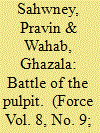

|
|
|
| 2 |
ID:
112174
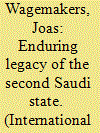

|
|
|
|
|
| Publication |
2012.
|
| Summary/Abstract |
The concept of al-wala? wa-l-bara? (loyalty to Islam, Muslims, and God and disavowal of everything else) has developed in various ways in Wahhabi discourse since the 19th century. This can partly be ascribed to the civil war that caused the collapse of the second Saudi state (1824-91) and the lessons that both quietist and radical Wahhabi scholars have drawn from that episode. In this article, I contend that Wahhabi contestations of al-wala? wa-l-bara? can be divided into two distinct trends-one social and the other political-and that both show the enduring legacy of the second Saudi state, which can still be discerned in Wahhabi scholarly writings on the subject of al-wala? wa-l-bara? today.
|
|
|
|
|
|
|
|
|
|
|
|
|
|
|
|
| 3 |
ID:
101348
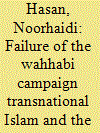

|
|
|
|
|
| Publication |
2010.
|
| Summary/Abstract |
The Salafi madrasa has evolved in Indonesia as a consequence of Saudi Arabia's immensely ambitious global campaign for the Wahhabization of the Muslim umma. Demonstrating the importance of transnational networks in shaping the current dynamics of Indonesian Islam, the madrasa appears to be the centre of excellence for the Salafi protagonists to spread Saudi-style Wahhabi Islam among Indonesian Muslims at the grass-roots level. Its curriculum places an emphasis on the teaching of tawhid, or more precisely, Wahhabite doctrine. Meaning to accept and believe in the oneness of God and His absolute authority, tawhid is considered by the Salafis to be the pillar of the Muslim creed, whereby a superior moral order is established at the level of the individual, the family or the community. Because of its exclusive style and old-fashioned structure, it has attracted only a few abangan children, and thus has not brought about significant change. There is scepticism about the relentless effort of the Salafi teachers to recruit young villagers into their circles and introduce what they claim to be authentic Islam while criticizing local religious practices. Nonetheless, the impact of the madrasa has gone beyond the sphere of education. It has provided alternative access to education for underprivileged rural children and the downtrodden young and has offered a universal alternative model of truth and social action. Attempts to adjust the madrasa profile to the local context and national demands have been made by some Salafi protagonists in response to the geostrategic shifts and as a result of growing suspicion since 9/11 of the existence of the madrasa as a major training ground for terrorists.
|
|
|
|
|
|
|
|
|
|
|
|
|
|
|
|
| 4 |
ID:
068500


|
|
|
|
|
| Publication |
London, Little Brown, 2006.
|
| Description |
xiv, 349p.
|
| Standard Number |
0316729973
|
|
|
|
|
|
|
|
|
|
|
|
Copies: C:1/I:1,R:0,Q:0
Circulation
| Accession# | Call# | Current Location | Status | Policy | Location | IssuedTo | DueOn |
| 051062 | 297.814/ALL 051062 | Main | Issued | General | | RF053 | 04-May-2024 |
|
|
|
|
| 5 |
ID:
126909
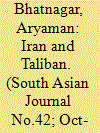

|
|
|
| 6 |
ID:
126640
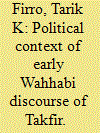

|
|
|
|
|
| Publication |
2013.
|
| Summary/Abstract |
This article compares the takfiri discourse (accusing people of being infidels) of the first and second generation of Wahhabi scholars with that of Muhammad Ibn 'Abd al-Wahhab, the founder of the Wahhabiyya. The article shows that these scholars had revised Ibn 'Abd Wahhab's position toward infidelity; a position which had been adopted by many Wahhabi scholars until the beginning of the nineteenth century. In their revision, they put an end to the ambivalent position toward takfir, emphasizing that warfare was the suitable means of interacting with religious and political opponents. To justify their approach, they reinterpreted not only the writings of the founder of Wahhabiyya but also those of Ibn Taymiyya and other Hanbali scholars. Their takfiri discourse remained alive among large segments of the masses and religious scholars in Sa'udi Arabia until today, though some Sa'udi kings and princes sometimes denounced it.
|
|
|
|
|
|
|
|
|
|
|
|
|
|
|
|
| 7 |
ID:
139112
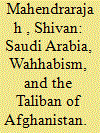

|
|
|
|
|
| Summary/Abstract |
This article argues that the Taliban's revolutionary war (RW) program is puritanical reform informed by the Islamic legal duty of al-amr bi'l-ma‘ruf wa'l-nahy ‘an al-munkar(‘commanding what is good and forbidding what is reprehensible’). It also examines the history of this duty with examples of puritanical reform movements emerging from Berber tribes in North Africa and tribes in Arabia. Furthermore, the importance of this duty in Wahhabi Saudi Arabia, and its exportation to Pakistan where Taliban leaders imbibed this ideology, are discussed. Finally the article shows that corruption and abuses by the Afghan regime have given impetus to puritanical reformers: the condition precedent for puritanical reform is pervasive wrongdoing in an Islamic society.
|
|
|
|
|
|
|
|
|
|
|
|
|
|
|
|
| 8 |
ID:
083314
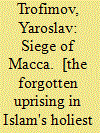

|
|
|
|
|
| Publication |
New York, DoubleDay, 2007.
|
| Description |
xii, 301p.hbk
|
| Standard Number |
9780385519250
|
|
|
|
|
|
|
|
|
|
|
|
Copies: C:1/I:0,R:0,Q:0
Circulation
| Accession# | Call# | Current Location | Status | Policy | Location |
| 053864 | 953.8053/TRO 053864 | Main | On Shelf | General | |
|
|
|
|
| 9 |
ID:
102597
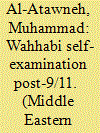

|
|
|
|
|
| Publication |
2011.
|
| Summary/Abstract |
Saudi Arabia found itself under an unflattering spotlight in the wake of the events of 9/11, perhaps more than any other country in the Middle East. The fact that 15 of the 19 suicide skyjackers were Saudi citizens provoked an avalanche of criticism in the West as well as in some parts of the Islamic and Arab world against Saudi religious beliefs, rulers, social customs, and school curricula. This article traces the Wahhabi Post-9/11 ideological "self-examination" of relationships with non-Wahhabis. Emphasis will be placed on the current Wahhabi perceptions of the fundamental terms of "other" and "otherness" that are most likely to affect relationships between the Wahhabis and other cultures and religious groups. I argue that post-9/11 Wahhabi Islam acknowledges the problematic nature of its traditional perception of the 'other' and, therefore, is making significant and unprecedented efforts to reformulate and redefine religious doctrines, such as jihad, tolerance, interfaith dialogue and so forth.
|
|
|
|
|
|
|
|
|
|
|
|
|
|
|
|
|
|
|
|
|